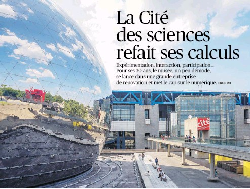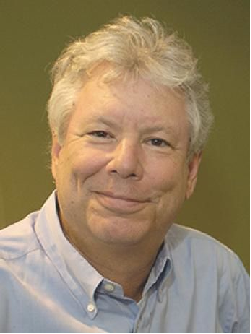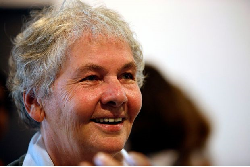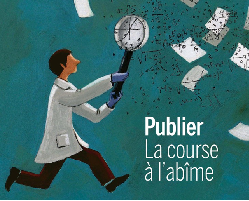October 2017 Research, Science and Knowledge
Read the articles selected in October 2017
EUA’s energy platform calls for universities to enhance their contribution to the energy transition and fight climate change
Source: http://www.eua.be/, 23 October
Universities have a role in the energy transition and in the fight against climate change, developing curricula e programmes that speak through all fields of scholarship about a low- carbon economy and training the citizens of the future, oriented towards knowledge and prosperity.
Read more:
Higher education cooperation for development and the Sustainable Development Goals: report from the EARMA/EUA seminar
Source: http://www.eua.be/, 19 October
Representatives from higher education and the European institutions gathered in a seminar at the European Parliament to prospect a more integrated approach towards the SDGs, requiring institutional synergies and public-private partnership, underlining the central role of universities in fostering change.
Read more:
World University Rankings 2018 by subject: engineering and computer science results out now
by Ellie Bothwell
Source: Times Higher Education, 17 October

The THE World Universities Rankings 2018 for engineering and technology and computer science represent US universities at the top together with Oxford, but also recognize the growth of Asian institutions in these subjects, a sign of political change about the transformative role of schools in advancing economies and societies.
Read more:
A shift to the global common good in higher education
by Lin Tian, Yan Wu & Niancai Liu
Source: http://www.universityworldnews.com, 20 October
Inspired by a notion of education transcending the antithesis common good/public good with the concept of human development, the Center for World-Class Universities in Shanghai Jao Tong University aims at cultivating talent, conducting the most advanced research and benefiting all humanity of our interconnected planet.
Read more:
http://www.universityworldnews.com/article.php?story=20171018100006575
Teachers for tomorrow
by Andreas Schleicher
Source: http://www.oecd.org, 19 October
The first Qudwa Global Teachers Forum in Abu Dhabi has drawn up the teaching profession in the digital era. As like ever, the task of teaching is helping all learners to understand their aspirations and passions. Technology can’t replace a poor education but can boost a great educational work.
Read more:
https://oecdeducationtoday.blogspot.it/2017/10/teachers-for-tomorrow.html
Why Europe needs an HE learning and teaching forum
by Michael Gaebel
Source: http://www.universityworldnews.com, 13 October
The need for enhancing skills of citizens and workers declared by the European Commission has shifted the attention to higher education and governmental institutions from research and research excellence to learning and teaching methods in the sight of a general acceptance of new educational approaches.
Read more:
http://www.universityworldnews.com/article.php?story=20171010152453597
Neurodiversity in Education
Source: http://www.oecd.org
The increasing diagnoses of neurodevelopmental disorders put a case for adequate teaching and assessment methods as well as for defining academic goals for children with learning disabilities. Avoiding assessment is not a solution for an inclusive classroom.
German researchers resign from Elsevier journals in push for nationwide open access
by Gretchen Vogel
Source: Science, 13 Ottobre

Negotiations between a German research consortium and the Dutch giant Elsevier about a new payment “publish and read” model for Germany-based researchers have ended with the resignations of five scientists from their editorial positions in the company.
Read more:
How could Macron’s “European universities” work?
by David Matthews
Source: Times Higher Education, 15 October

At least 20 European universities are expected to be funded by 2024, after a proposal launched by French President Macron. It’s a project of a network of existing universities with a common curriculum, that would allow the free circulation of students among European countries, creating “a sense of belonging “.
La Cité des sciences refait ses calculs
by Claire Bommelaer
Source: Le Figaro, 14 October

After the technological revolution even the Cité des sciences et de l’industrie in Paris, which in thirty years has lured 89 million tourists turns out to be dated and is organizing a new investment plan to become more interactive and digital.
New Skills Agenda for Europe
Source: http://ec.europa.eu/
The New Skills Agenda for Europe aims at a quality professional training for all European citizens, as well as a better use of the available skills through a better understanding of qualifications and the creation of information tools useful for career and learning choices.
Why innovation becomes imperative in education
by Dirk Van Damme
Source: http://www.oecd.org, 4 October

Innovation is not only about the latest technological devices but also includes societal change. Opening education to the challenges of digitalization and artificial intelligence requires a school system connected with the outside world of business and local communities and driving the change.
Read more:
http://oecdeducationtoday.blogspot.it/2017/10/why-innovation-becomes-imperative-in.html
OECD Skills Strategy Diagnostic Report Italy 2017
Source: http://www.oecd.org/, 5 October
This report photographs Italy in a struggling progress towards a society based on the achievement of relevant skills, giving a series of recommendations in sight of the targets set by the ambitious education and labor reforms of the last years.
Reproductibilité en crise
Source: Le Monde, 4 October
Science as a reliable fundament for rational decisions must offer the possibility to reply and confirm its results. The reproducibility crisis doesn’t mean that the scientific system can’t improve through more rigor and transparency.
Pioneer of “nudge” science and explorer of irrational decisions earns economics Nobel
by Adrian Cho
Source: Science, 9 October

With a modest amount of mathematics and a bright, admirable style Richard Thaler has developed a model which explains the apparent contradiction in the behavior of the economic agent integrating concepts borrowed from psychology and neuroscience that have changed the face of the economic policy.
Read more:
A female Nobel winner: the enduring inspiration of the rarest of scientists
by Erika Mancini
Source: Times Higher Education, 29 September

Even though more and more women start a scientific career today, female scientists don’t have the same social standing as male colleagues and are not fully acknowledged in their achievements. The rare female Nobel Prizes in science should inspire new generations.
Internationalisation of HE needs to be replaced
by Fay Patel
Source: http://www.universityworldnews.com, 29 September

Internationalisation of higher education is a Western paradigm based on the hegemony of the First-World’ Western knowledge. The glocalization of learning, adopted by the 2030 Agenda, means the construction of knowledge forms that embrace other worldviews, is inclusive and focused on quality and inclusivity.
Read more:
http://www.universityworldnews.com/article.php?story=20170927101224475[RC1]
Timing is everything: U.S. trio earns Nobel for work on the body’s biological clock
by Gretchen Vogel & Erik Stokstad
Source: Science, 2 October

U.S. trio has won this year’s Nobel Prize in Physiology or Medicine for their work on the genes influencing the circadian rhythms, which affect the activity of most other genes in the organisms. The demonstration of the fundamental importance of the biological clock has opened a whole research field.
Read more:
Le prix Nobel, science inexacte
by Nathaniel Herzberg
Source: Le Monde, 3 October
Even Nobel laureates get wrong sometimes, but science goes forward. The controversies raised every year by the Prizes’ assignment show not only the existence of an establishment, but also that research is not a progressive and linear path, and sometimes it is detached from experience.
How do schools compensate for socio-economic disadvantage?
Source: http://www.oecd.org
Learning environments and effective resources are related to better students performance, playing a role in addressing social inequalities. The allocation of additional funds for disadvantaged schools improves the general science performance, but also teacher support matters.
[RC1]co
Universities are ready to contribute to the Future of Europe
Source: http://www.eua.be/
Within the knowledge economies, the role of universities and their core mission to do research, education, and innovation are central, enabling citizens to navigate in rapidly changing labor markets, while promoting civic values and bringing the European project forward.
Publier. La course à l’abîme
by Pascaline Minet & David Larousserie
Source: Le Monde, 27 September

The system of editors publishing scientific papers, based on the subscriptions to specialized reviews is high-priced and restricting the access to knowledge. But the monopoly of the major publishers is weakening, while alternative models of open access are standing up.
UK science seeks “a new relationship with EU”
by Meredith Wadman & Adrian Cho
Source: Science, 20 September
After Brexit, UK government’s aim is not only to continue the access to European research programs, but it declares to want to make the UK an attractive place for researchers from all around the world and to treat science as a particular case to protect from Brexit effects with extra funding.
Faculty promotion must assess reproducibility
by Jeffrey Flier
Source: Nature, 12 September
To make science more reliable, it is crucial the way candidates for research institutions are appointed and promoted. Reviewers should assess not just how a field would be without a researcher’s contribution, but also the reproducibility of his work, together with his capacity for critical self-reflection.
Read more:
https://www.nature.com/news/faculty-promotion-must-assess-reproducibility-1.22596
State of the Union: Ambitions need to be backed by boosting research and education
Source: http://www.eua.be/, 21 September
A Europe leader in innovation needs ambitious investments in research and education. The EU framework programmes for research and innovation support European cooperation in higher education and research, funding projects that would otherwise not be developed and boosting Europe’s long-term competitiveness.
Info
- Pubblicato il : 19/12/2017 Modificato il : 04/04/2019
Allegati
- La Cité des sciences pdf
- A sense of belonging pdf
- Neurodiversity pdf
- Economics Nobel
- Reproductibilité en crise pdf
- Skills Diagnosticoecd Report Italy pdf
- New Skills Agenda for Europe pdf
- How do schools compensate for inequalities pdf
- Le prix Nobel, science inexacte pdf
- A female Nobel winner pdf
- Euas response to the State of the Union pdf
- UKs new relationship with EU pdf
- Publier. La course à l'abime pdf
- The future of Europe pdf

